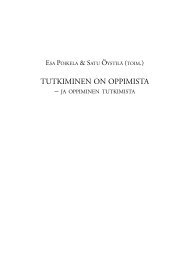Note on this edition: this is an electronic version of the 1999 book ...
Note on this edition: this is an electronic version of the 1999 book ...
Note on this edition: this is an electronic version of the 1999 book ...
You also want an ePaper? Increase the reach of your titles
YUMPU automatically turns print PDFs into web optimized ePapers that Google loves.
Unravelling <strong>the</strong> Dem<strong>on</strong>ic Text 85o<strong>the</strong>rness, however, has been different from Foucault’s. Roy Boyne, in h<strong>is</strong>Foucault <strong>an</strong>d Derrida: The O<strong>the</strong>r Side <strong>of</strong> Reas<strong>on</strong> (1990) emphas<strong>is</strong>es <strong>th<strong>is</strong></strong> differenceby claiming that <strong>the</strong> relati<strong>on</strong>ship to o<strong>the</strong>rness <strong>is</strong> to <strong>the</strong> Foucault <strong>of</strong>Folie et déra<strong>is</strong><strong>on</strong> <strong>the</strong> <strong>on</strong>e <strong>of</strong> a mystic, <strong>an</strong>d to Derrida that <strong>of</strong> a tragedi<strong>an</strong>. 17When Foucault wrote h<strong>is</strong> h<strong>is</strong>tory <strong>of</strong> madness, he claimed that he was notwriting a h<strong>is</strong>tory <strong>of</strong> psychiatry (a machinery <strong>of</strong> appropriati<strong>on</strong> <strong>an</strong>d subordinati<strong>on</strong>ra<strong>the</strong>r th<strong>an</strong> treatment for Foucault), but <strong>of</strong> “madness itself” before beingcaptured by knowledge. 18 He <strong>is</strong> not writing a h<strong>is</strong>tory <strong>of</strong> <strong>the</strong> l<strong>an</strong>guage <strong>of</strong>psychiatry (or, “reas<strong>on</strong>”), but <strong>an</strong> “archaeology <strong>of</strong> <strong>the</strong> silence” as madness <strong>is</strong>denied <strong>the</strong> right to speak. 19Derrida tackles <strong>the</strong> “madness” <strong>of</strong> <strong>th<strong>is</strong></strong> project, <strong>an</strong>d asks whe<strong>the</strong>r <strong>an</strong> “archaeology”<strong>of</strong> silence would not still be within <strong>an</strong> order <strong>of</strong> reas<strong>on</strong>; if <strong>on</strong>estarts to speak <strong>of</strong> silence, it <strong>is</strong> not so silent <strong>an</strong>y more. “[E]verything tr<strong>an</strong>spiresas if Foucault knew what ‘madness’ me<strong>an</strong>s. Everything tr<strong>an</strong>spires as if,in a c<strong>on</strong>tinuous <strong>an</strong>d underlying way, <strong>an</strong> assured <strong>an</strong>d rigorous precomprehensi<strong>on</strong><strong>of</strong> <strong>the</strong> c<strong>on</strong>cept <strong>of</strong> madness, or at least <strong>of</strong> its nominal definiti<strong>on</strong>, werepossible <strong>an</strong>d acquired.” 20 For Derrida, <strong>th<strong>is</strong></strong> me<strong>an</strong>s that if Foucault has <strong>an</strong> idea<strong>of</strong> madness, <strong>the</strong>n it <strong>is</strong> also a lingu<strong>is</strong>tic idea, all through, <strong>an</strong>d embedded in <strong>the</strong>system <strong>of</strong> thought he simult<strong>an</strong>eously aims to oppose. Derrida interprets ourbeing as embedded in <strong>an</strong>d c<strong>on</strong>stituted by our system <strong>of</strong> signs; <strong>th<strong>is</strong></strong> holdstrue, for example, for <strong>the</strong> case <strong>of</strong> memory. Derrida writes in “Plato’s Pharmacy”that “Memory always <strong>the</strong>refore already [a favourite expressi<strong>on</strong> <strong>of</strong>Derrida] needs signs in order to recall <strong>the</strong> n<strong>on</strong>-present, with which it <strong>is</strong> necessarilyin relati<strong>on</strong>. […] But what Plato dreams <strong>of</strong> <strong>is</strong> a memory with no sign.That <strong>is</strong>, with no supplement.” 21 The endless lack <strong>an</strong>d line <strong>of</strong> substitutes for<strong>the</strong> object <strong>of</strong> desire in Lac<strong>an</strong>i<strong>an</strong> <strong>the</strong>ory <strong>is</strong> matched by Derrida’s ins<strong>is</strong>tence <strong>on</strong><strong>the</strong> deferral <strong>an</strong>d differing (differ<strong>an</strong>ce) <strong>of</strong> <strong>an</strong>y fullness <strong>of</strong> presence, or me<strong>an</strong>ing,<strong>an</strong>d <strong>on</strong> “supplementarity” as inseparably intertwined in our being. 22 InOf Grammatology (De la Grammatologie, 1967) he exp<strong>an</strong>ds h<strong>is</strong> <strong>an</strong>alys<strong>is</strong> <strong>of</strong><strong>th<strong>is</strong></strong> process in Rousseau’s C<strong>on</strong>fessi<strong>on</strong>s as a <strong>the</strong>ory <strong>of</strong> reading a text:No model <strong>of</strong> reading seems to me at <strong>the</strong> moment ready to measure up to<strong>th<strong>is</strong></strong> text – which I would like to read as a text <strong>an</strong>d not as a document.Measure up to it fully <strong>an</strong>d rigorously, that <strong>is</strong>, bey<strong>on</strong>d what already makes<strong>the</strong> text most legible, <strong>an</strong>d more legible th<strong>an</strong> has been so far thought. My<strong>on</strong>ly ambiti<strong>on</strong> will be to draw out <strong>of</strong> it a significati<strong>on</strong> which that presumed17 Boyne 1990, 54.18 Foucault 1961, vii.19 Ibid., ii.20 Derrida 1968/1978, 41.21 Derrida 1972/1981, 109.22J<strong>on</strong>ath<strong>an</strong> Culler has summar<strong>is</strong>ed Derrida’s d<strong>is</strong>cussi<strong>on</strong> <strong>of</strong> supplementary logic inRousseau (“nature” as supplemented by “educati<strong>on</strong>,” or culture): “The logic <strong>of</strong> supplementarity[…] makes nature <strong>the</strong> prior term, a plenitude which was <strong>the</strong>re at <strong>the</strong> start, butreveals <strong>an</strong> inherent lack or absence within it <strong>an</strong>d makes educati<strong>on</strong> something external <strong>an</strong>dextra but also <strong>an</strong> essential c<strong>on</strong>diti<strong>on</strong> <strong>of</strong> that which it supplements.” (Culler, “JacquesDerrida”; in Sturrock 1979/1992, 168).














